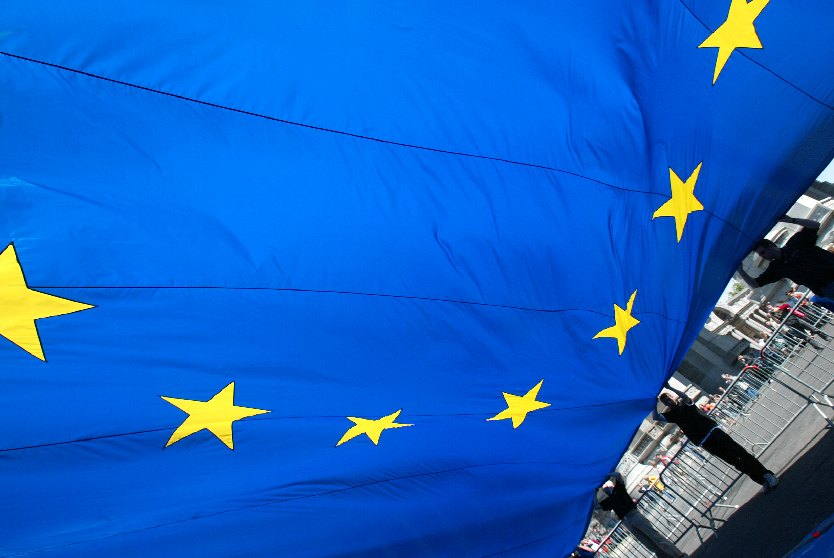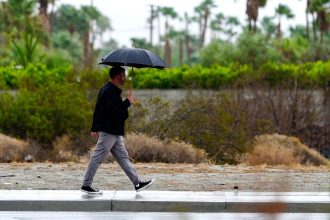EU countries sought Thursday to settle on an emissions-cutting plan to bring to a key UN conference in Brazil, as divisions on the bloc’s green agenda threaten its global leadership on climate.
Environment ministers for the 27-nation bloc gathered in Brussels with the clock ticking down on a looming United Nations deadline to produce plans to fight global warming for 2035.
“At the end of the day, we will continue to be either the most ambitious or amongst the most ambitious,” Wopke Hoekstra, the European Commissioner for Climate, said of the yet-to-be-agreed-on EU plans ahead of the talks.
“I’m truly confident that that leadership role that we have played in the past will continue also this year and beyond”.
One of the world’s biggest greenhouse-gas emitters behind China, the United States and India, the EU has to date been the most committed to climate action, by some margin.
As such the bloc was hoping to pull ahead and derive its submission to November’s COP30 climate conference from a more ambitious 2040 goal.
But that is yet to be agreed by member states, leaving Brussels scrambling for a last-minute solution.
Denmark, which holds the EU’s rotating presidency, has suggested submitting to the UN a “statement of intent”, rather than a hard target.
That would include a pledge to cut emissions between 66.3 percent and 72.5 percent compared to 1990 levels — with the range expected to be narrowed down at a later stage.
“This approach would ensure that (the) EU does not go to (the) UN Climate Summit empty-handed,” said a spokesperson for the Danish presidency of the European Council.
But even that is hardly a done deal and talks on Thursday could prove lengthy. One European diplomat suggested reporters prepare “a sleeping bag”.
– ‘Better than nothing’ –
The nearly 200 countries party to the 2015 Paris Agreement on climate action were supposed to put forward updated policies in February, providing a tougher 2035 emissions reduction target and a detailed blueprint for achieving it.
But only a handful made the deadline, since extended to September — still allowing plans to be assessed before COP30 starts on November 10, in the Brazilian city of Belem.
While not as good as a formal submission, a “statement of intent” was “much better than nothing”, said a senior EU diplomat.
“It sort of saves the EU face at international level,” added Elisa Giannelli, of the E3G climate advocacy group.
The UN has pushed for world leaders, among them EU chief Ursula von der Leyen, to announce their commitments at the General Assembly in New York next week.
The EU has set a goal of becoming carbon neutral by 2050 under its so-called European Green Deal, and says it has already cut emissions by 37 percent compared to 1990.
But climate has increasingly taken a backseat in Brussels, as political winds turned.
With wars in Ukraine and the Middle East, security and defence are now top of mind, said Linda Kalcher, director of the Strategic Perspectives think tank.
Right-wing electoral gains in several member states and the European Parliament have curbed ambitions, and the European Commission has pivoted to boosting industry, faced with fierce competition from China and US tariffs.
– ‘Bad signal’ –
That was where the commission’s proposal to cut emissions by 90 percent by 2040 got bogged down.
Denmark and Spain are among those pushing for approval. But others, like Hungary, the Czech Republic and Poland, think it over-ambitious and detrimental to industry.
“Our analysis show we can do at great expense, 83 percent of reductions by 2040,” Krzysztof Bolesta, Poland’s state secretary for climate said Thursday, adding his goverment wanted an exemption for defence production.
France, which is suffering from shaky finances and a prolonged political crisis, wants more clarity on the investment framework to support decarbonisation before committing.
Last week Paris and Berlin called for the 2040 target to be discussed at a leaders’ summit in October — effectively pushing back a decision that the commission had hoped could have been reached Thursday.
The delay sent a “bad signal” and brought into question EU leadership, said Michael Sicaud-Clyet of environmental group WWF, adding that the bloc was “losing its credibility” on climate.









